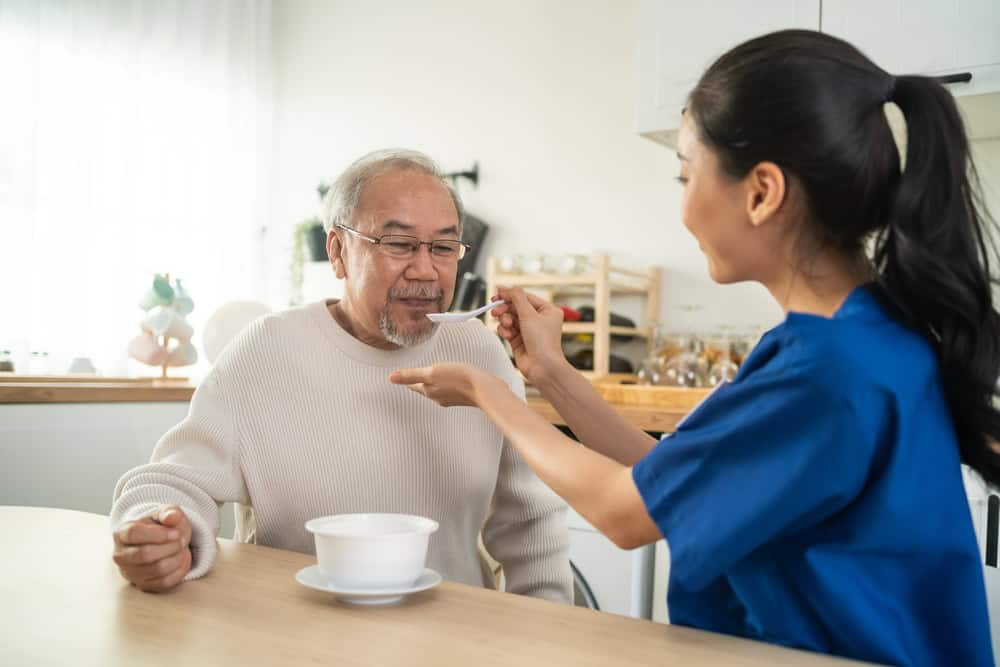
Watching your loved one struggle as they perform basic tasks can be heart-wrenching. You want to step in to ensure they are well taken care of, but sometimes, juggling other responsibilities like family or career while caring for your loved one can be too much.
Even if you try to manage the responsibility, over time, your loved one’s health may be complicated, requiring more attention and specialized care that you cannot provide.
Hiring an at home caregiver to assist your loved one in this case would be ideal. Your loved one gets the best care, while you have peace of mind knowing they are in safe hands.
At home caregivers are essential as they play a vital role in ensuring your loved ones remain in the comfort of their homes and are independent at the same time. Sometimes, a senior might need assistance carrying out activities of daily living after surgery, disability, illness, or due to age. Understanding the vital role of in-home caregivers and how to hire them is essential in your loved one’s life.
This article will help you better understand at home caregivers including their benefits, what you must look out for while searching for an ideal candidate, and tips for choosing the right one.
What Are At home Caregivers?
At-home caregivers play an invaluable role in the lives of individuals requiring assistance with activities of daily living, like bathing and meal preparations, and helping people with chronic health conditions and disabilities. These caregivers will come into your loved one’s home and help with personal care, medication management, and companionship.
With an in-home caregiver, your loved one will continue living in the comfort, familiarity, and safety of home.
At home caregivers play a crucial role in a senior’s overall well-being and help improve their quality of life (QOL).
Benefits of Using At-Home Caregivers
Aging is a natural process that even science can’t stop entirely. As the number of the senior population increases, they will need some type of personalized care, and as seniors prefer to age at home, at home caregivers will always be in demand.
Below are the key benefits of in-home caregivers:
Allows seniors to remain independent in their own homes
Sometimes, your loved one may fail to admit they are struggling with activities of daily living (ADLs) because they fear losing their independence. However, one of the critical benefits of hiring an athome caregiver is that it allows your loved one to remain in the comfort of their home, thereby retaining their independence.
An in-home caregiver will assist your loved one to perform only the daily tasks they need help with. This way, seniors feel in control of their lives, and receive help when they need it.

Personalized care tailored to individual needs
When older adults have an at-home caretaker, you will be sure they will receive personalized care tailor-made to meet their unique needs. Personalized care allows seniors to receive adequate support and helps build trust between their loved ones, caregivers, and healthcare service providers.
Companionship and emotional support
A caregiver will provide companionship to your loved one, ensuring they are not lonely and have someone to talk to. A senior will be happy sharing some of their fond memories, which helps with their memory and keeps them happy. A live-in caregiver will also provide emotional support to a senior, becoming a shoulder to lean on when needed.
For instance, at Amy’s Eden Senior Care, we know that it’s the little things that make a difference in the lives of seniors. Our caregivers strive to learn the little things that make your loved one happy.
Assistance with daily tasks and activities
Most older adults don’t like asking for help. This is true, especially for parents; they want to be the ones helping you and the change in the dynamics might be hard at first. However, when you bring in an at home caregiver, your aging parents may find it easier to ask for assistance without feeling guilty.
Care in-home caregivers will assist your loved one with activities of daily living such as:
- Bathing
- Dressing
- Toileting
- Laundry
- Incontinence care
- Grooming

Safety, Convenience, and Comfort
Research shows seniors who stay home recover faster and with fewer complications than their hospital counterparts. An at-home caregiver will provide medication management assistance, ensuring your loved one takes their medications at the right time and in the proper dosages. Additionally, seniors will stick with their routine when they have someone looking out for them and in familiar surroundings.
Types of At Home Caregiver Services
The are different types of at home caregiver services depending on the needs of your loved one. You can arrange this care for your loved one through private agencies or local councils.
At Amy’s Eden, we can arrange to have our caregivers visit your loved one at home, or wherever they call home like our assisted living homes. Our services range from personal care to respite care, and more advanced care like hospice care.
The following are the most common in-home care services available.
Basic In-home caregiver services
Depending on your loved one’s needs, the caregiver may come daily or a couple of days during the week.
Before a caregiver is accustomed to your loved one’s schedule and preferences, you must provide them with a list of tasks you expect them to perform while they are at your loved one’s home.
If your loved one lives with others, an at-home caregiver’s duties are limited to the older adult they care for. An in-home caregiver does not perform duties and activities for the other people living with the person they are caring for.
Some of the duties of an in-home caregiver include:
- Assisting a senior performing activities of daily living
- Transportation to and from their doctor’s appointments
- Light housekeeping
- Running errands
- Accompanying a senior during their walks or exercise routine
- Offering companionship.
Live-in care providers
Sometimes, your loved one might need a caregiver who lives with them, especially if they have dementia and other memory impairments. At other times, you may consider a live-in care provider if your loved one can not be safely left alone due to chronic medical conditions that are accompanied by sudden emergencies.
A live-in caregiver is available round-the-clock to help a senior with a bathroom or redirect them when they wander off. Additionally, they assist with personal care, medication management, and companionship.
When you hire a live-in caregiver, you should establish boundaries and let the caregiver know what you expect from them and their space. You must understand that even if this caregiver is open 24 hours to work, they must rest and time off.
Respite care for family caregivers
Respite care is a short-term relief that allows you, as a primary caregiver, to rest.
Caring for your loved one full-time is noble but can be physically, mentally, and emotionally draining. In most cases, caring for your loved one full-time and attending to other responsibilities such as work and family obligations is challenging
You can take a break from caring for your loved one to run errands or recharge. You can access respite care services from various settings like:
- Adult daycare services
- In-home care services
- Overnight care at a residential care home.
You can arrange for respite care regularly when you have something else to do. When organizing for respite care, you need to consider your loved one’s needs and factor in your own.
Respite care services give you peace of mind as the primary caregiver, knowing you can attend to your needs while your loved one is in the hands of a qualified caregiver.

Dementia care services
You can access dementia care services through at-home care services. In addition to dementia care (psychological and emotional support), an in-home caregiver will help them with their ADLs, such as toileting, meal preparation, dressing, medication assistance, and companionship.
Companion care services
When an at-home caregiver visits your loved one’s home, they will provide companionship. Companionship care helps give your loved one’s life color. They have someone to accompany them during their walks, enjoy gardening, or listen to their favorite music. Companionship is one way of ensuring your loved one’s quality of life improves.
Finding the Right In-Home Care for the Elderly
Trusting someone to care for your loved one can be challenging. You want someone who will understand your aging loved one and treat them with respect and as the individuals they are. Many agencies offer in-home care services, and choosing the ideal one can be challenging.
Here are some factors to consider when selecting the right candidate to come and care for your loved one.
Know your loved one’s needs
You can start this process by listing your loved one’s needs. On the list include:
- The type of assistance that your loved one will require like bathing, shopping, transportation, toileting, dressing, recreational services, light housekeeping, and meal preparations.
- The specific times when your loved one requires assistance
- Your loved one’s preferences
- Health considerations
- Physical and emotional limitations
- Caregiver traits and qualifications that would match those needs
Create a budget
After listing your loved one’s needs and preferences, the next step is creating a budget. This budget will help you decide on the hours a caregiver will visit your loved one and guide you on the hours you can afford.
When searching for an in-home caregiver, look for an agency without hidden or unexpected costs. You can check the agency’s website for reviews and see how they respond to negative reviews.
Gather In-home Care Recommendations
Ask for recommendations from family, friends, healthcare providers, and local organizations for at-home care services. If you have someone with personal experience with at-home caregivers, their recommendations and referrals will help you immensely.
Browse in-home care services offered
After narrowing down the agencies you would like, the next step is to check the type of services they offer. Depending on your loved one’s care needs, look for an agency offering the services you are after. Sometimes, your loved one might have a complicated health condition needing specific care. You can look for a caregiver willing to work alongside other care providers, such as a skilled nurse.

Do an Agency Background Check
When hiring an agency at-home caregiver, ensure you learn more about the agency’s:
- History
- Insurance
- Background
- Bonds
- Licensing
Check for Caregiver Qualifications
If you are hiring an agency to provide you with an at-home caregiver, check how they determine their qualifications. Ask the agency about the caregiver’s qualifications, continuing training and background checks
Due to the vulnerability of seniors needing caregiving services, a caregiver’s background check is usually more intensive than any other employment background check. During this check, a prospective licensed care provider will be looking for some of the following information:
- Previous criminal convictions
- If the prospective employee is listed on the abuse and neglect registry
- Any pending criminal cases
- Listing on the sex offender registry
- Education verifications
- Domestic terrorist watch listing
Check for Caregiver Availability
Ensure you ask the agency how it pairs caregivers with clients and their availability. Sometimes, it may take time before the agency can pair your loved one with a caregiver. Additionally, ask about their caregiver’s days off. Is a replacement available when your loved one’s caregiver is absent? If they do, how will they ensure compatibility with your loved one?
Resources for finding reputable in-home care providers
Some of the available resources for finding reputable in-home caregiver providers include the following:
- Eldercare locator
- Alzheimer’s Association
- AARP
- Local area agencies on aging
- Aging Life Care Association
- Caring Connections
- Home Care Association of America
- Elderweb
- Senior Services of Seattle
- Family Caregiver Alliance

Questions To Ask When Interviewing Potential Caregivers
The decision to hire an at-home caregiver is enormous, and you must be comfortable with it. Some of the following questions will be running in your mind:
- Will my loved one get along with the caregiver?
- Will my loved one be ok with a new person in their home?
- Is the caregiver the right one for my aging loved one?
- Can I trust this stranger with my loved one’s care and well-being?
You need to understand that, just like any new relationship, there will be an initial awkward phase before your loved one and the caregiver get to know each other and get along seamlessly.
When searching for an ideal candidate to care for your loved one, you can ask some of the following questions to help you increase the chances of a perfect match for your loved one.
- In your opinion, are you a professional caregiver?
- What made you decide to become an in-home caregiver?
- What motivates you to continue working as a caregiver?
- What is your area of specialization?
- What are your hobbies?
- Tell me why you choose to work with seniors.
- What are your future aspirations?
- Do you set personal goals when you start a new job with a new client? If you do, please share some of your past goals and how you worked towards accomplishing them.
- What’s your greatest weakness as a caregiver, and how are you working towards improving in that area?
- Do you have career goals, and can we help you achieve them?
- Do you have experience working with seniors living with chronic health conditions? What challenges have you encountered while working with these seniors?
- How would you describe your experience working with older adults, and what are the challenges?
- What makes you think you are an ideal candidate to look after my loved one?
- How do you teach a senior a new skill that you feel they need to have?
- Do you disagree with your supervisor on the best way to care for a client?
- If my loved one refused to eat, shower, or take their medications, what would you do in such a case?
- How do you handle rude clients that use derogatory language on you?
- If I were to sit down with your previous employer, what positive and negative things would they say about you as a person?
- If I hire you, what kind of training would you like me to provide you with to help you as a caregiver?
- If you needed in-home caregiver services, what skills would you like your caregiver to possess?
- Do you have any questions for me?

Ensuring Quality Care with at-home Caregivers
There are several ways you and the at-home caregiver can work together to ensure your loved one receives quality care while in the comfort of their home. They include:
Developing a care plan with the caregiver
When developing a care plan for your loved one, you need only outline all their needs and how you want a caregiver to meet them. Doing this promotes your loved one’s safety and quality of life and ensures they get better health. Additionally, a care plan prevents caregiver burnout as the caregiver will only try to do some things simultaneously.
A care plan is different from the plan of care that most healthcare providers usually provide. A senior’s care plan is essential in caregiving as it helps you and the caregiver arrange extra support, stick to a schedule, and prepare for non-medical health needs.
When creating a senior’s care plan, ensure you address the following areas:
A senior’s physical health: Physical health will help guide you in addressing your loved one’s needs. The following questions will help you identify physical health needs:
- How is your loved one’s sight? Can they see well?
- Does your loved one have hearing problems?
- Will your loved one require wound dressing, catheter, and other medical services?
- Does your loved one have chronic medical conditions like heart problems, diabetes, high blood pressure, or arthritis?
- Does your loved one have incontinence issues?
- Does your loved one have medications to manage their health conditions, and if they do, can they take these medications on their own?
Your loved one’s mental health How is your loved one’s mental health? Do they have anxiety, depression, or any other mental health issues?
Other considerations include:
- Can your loved one move around safely?
- How is your loved one’s ability to perform daily activities?
- Is your loved one in a position to handle their finances?
- Can your loved one manage housework?
- Can your aging senior drive?
- What are your loved one’s hobbies?
- How is your loved one’s social calendar?
- Is your loved one’s home hazard-free?

Takeaway
At-home caregiver services offer personalized care and support to your loved one in the comfort of their home. This type of care mainly focuses on ensuring your loved one spends their golden years at home while receiving top-notch care.
When seniors stay at home surrounded by familiar things and have easy access to their healthcare providers and caregivers, they will thrive and improve their quality of life.
Choosing the right at-home caregiver doesn’t mean you have failed or are giving up on your loved one. It means you prioritize their care and ensure they receive the best care possible. An at-home caregiver provides your loved one with comfort and retains their dignity even as they struggle with their medical condition, disability, or age.
If you or your loved one needs an at-home caregiver to help with their care or respite care, explore Amy’s Eden Senior Care services. Our in-home caregivers are uniquely skilled to care for seniors needing all levels of care.
We will work with your loved one’s doctors, nurses, and other service providers to ensure they have the best care possible during their twilight years. If you want to learn more about our at-home caregiving services, please contact us, and our team will guide you and answer any questions you might have.




